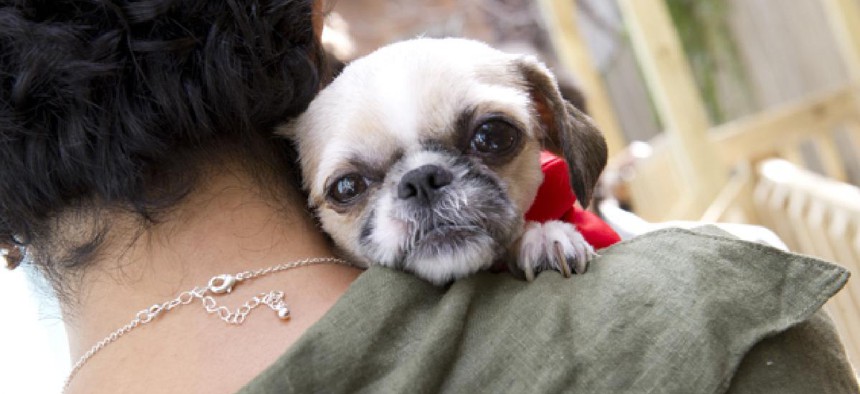Urban Resource Institute: Building pet havens for city families in crisis

Domestic violence victims who are pet owners face a moral dilemma: escape to one of the 50 or more city shelters that prohibit animals, or remain at risk. Nearly half of this cohort chooses to remain at risk rather than abandon four-legged family members to an unsafe environment, according to the National Coalition Against Domestic Violence. Urban Resource Institute thought there had to be a better way.
URI, which has sheltered domestic violence survivors since 1984, offers New Yorkers another choice with a program called URI People and Animals Living Safely (URIPALS). In partnership with pet supply retailer Nestlé Purina PetCare, URI recently opened its third pet-friendly domestic violence shelter in New York City with a dog park – currently the only organization in New York City that operates pet-friendly domestic violence shelters. By donating food and supplies to the shelter, Purina helps URIPALS welcome pets that might otherwise have been left behind or shuttled to an ASPCA kennel.
A large segment of New York’s 60,000-strong homeless population consists of people who are escaping domestic violence. As one of the largest providers of domestic violence shelters in New York City, URI assists over 1,600 domestic violence survivors annually. To date URI operates three parks in two boroughs, providing safe haven to more than 60 families and about 80 assorted pets. Typically a family spends about six months at a URI domestic violence shelter while receiving counseling and job training.
“URI’s primary goal is to remove all obstacles for those facing domestic violence,” said URI president and CEO Nathaniel Fields, who has devoted most of his long career to the organization. An alumnus of Fordham University’s Graduate School of Social Service, Fields serves as co-chairman of the New York City Coalition of Domestic Violence Residential Service Providers and as a board member of Today’s Students Tomorrow’s Teachers.
“At first, the government was reluctant to approve the program due to allergen and safety issues,” he recalled. Fortunately, URI quickly found support from two nonprofit partners, The Mayor’s Alliance for New York City’s Animals and the ASPCA. With their help, all the pets were microchipped, inoculated and treated for trauma when necessary, removing lingering health concerns.

The pet haven at URI’s Urban Women’s Retreat domestic violence shelter offers a space for survivors and their pets to play and heal together. (Photo Credit: Urban Resource Institute)
Founded 35 years ago in Brooklyn as an affiliate of the Addiction Research and Treatment Corporation, URI became an independent entity in 2012. It is headquartered in lower Manhattan and operates with a budget of $32 million and a staff of over 280 professionals. In addition to its domestic violence program, URI also offers residences and treatment and care programs for New Yorkers with developmental disabilities, as well as homeless services.
Fields said the ‘eureka’ moment that sparked the URIPALS initiative came after attending a 2012 talk by Allie Phillips, an attorney and animal rights activist and the author of “Defending the Defenseless.”
“A pet-friendly shelter is such a wonderful idea, I wondered why it hadn’t been done in the past,” URI Vice President of Domestic Violence Programs Jennifer White-Reid said when Fields first introduced the idea to her. White-Reid, an attorney, initially assumed there might be legal barriers. But after her due diligence revealed there was “no language that would prohibit URI from establishing a pet-friendly center,” all systems were go.
In 2013 the pilot launched with cats and other small animals and was met with instant success. “We’ve observed how all the residents in the shelter engage with the pets, which produces a healing environment and provides comfort for everyone,” said Fields. “Pets play such an important role in the healing process for a family that walked out of an abusive situation maybe only two hours ago. ”
Staff members who had reservations about dealing with animals in addition to survivors of domestic violence were quickly won over. “After listening to a survivor’s horrific story, meeting an adorable dog brightens the mood for the staff,” said White-Reid. “There is a lot of research on the value of the human-animal bond.”
“In fact, staff has since become the biggest champions of the program, as it enhanced our knowledge base of the therapeutic value of co-sheltering, “ added Fields, who hopes to adopt his own pet next year.
Purina, which discovered URIPALS through social media, supports the program with “welcome packs,” pet food, crates and toys. Co-shelters quickly filled to capacity, meaning pet owners in crisis are being turned away all the time. To accommodate more families, URI plans to add URIPALS units to its other shelters.
“We’re so grateful to Purina for their support and intellectual capital,” said Fields, who cites raising funds for this effort as his greatest challenge. “Based on our results, Purina is now working on a similar initiative in its hometown of St. Louis.”
To spread the word nationally, URI looks forward to introducing legislation to allow pets in shelters for the domestic violence community appropriately named PAWS – Pets and Women Safety Act – with the help of U.S. Sens. Charles Schumer and Kirsten Gillibrand.
“We want to lend our voice to a national movement to raise awareness to this issue, which is a silent killer, ” said White-Reid. Yet there are lighthearted moments, such as a schoolchild who arrived with a bearded dragon, perched on his shoulder. “By allowing more shelters to open their doors to animals, we can remove barriers and give a new start to a family that may have left everything else behind.”
